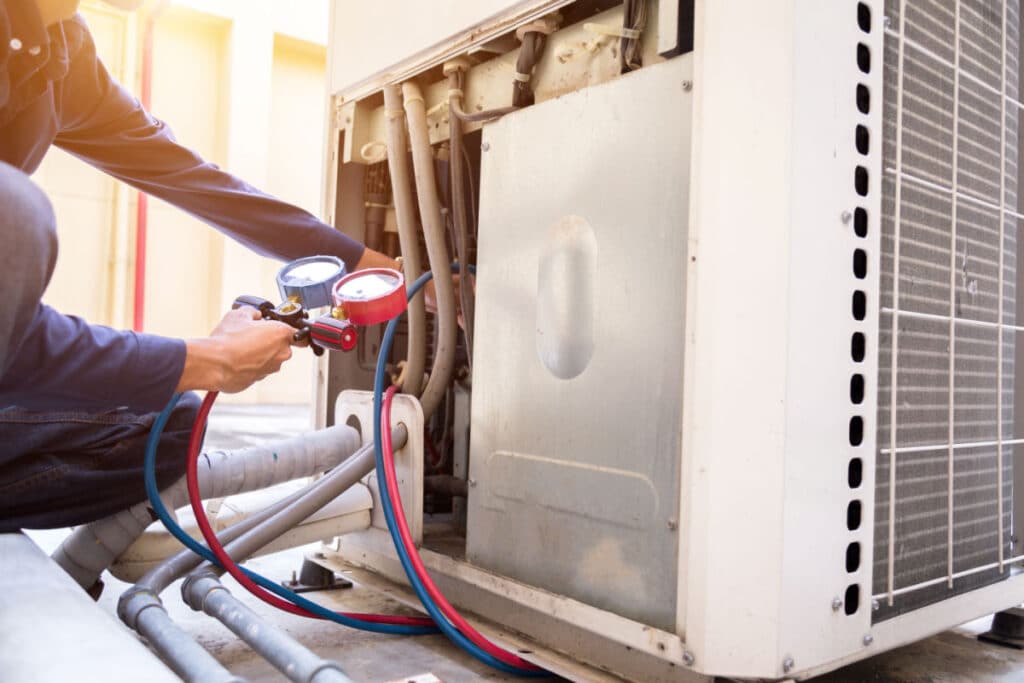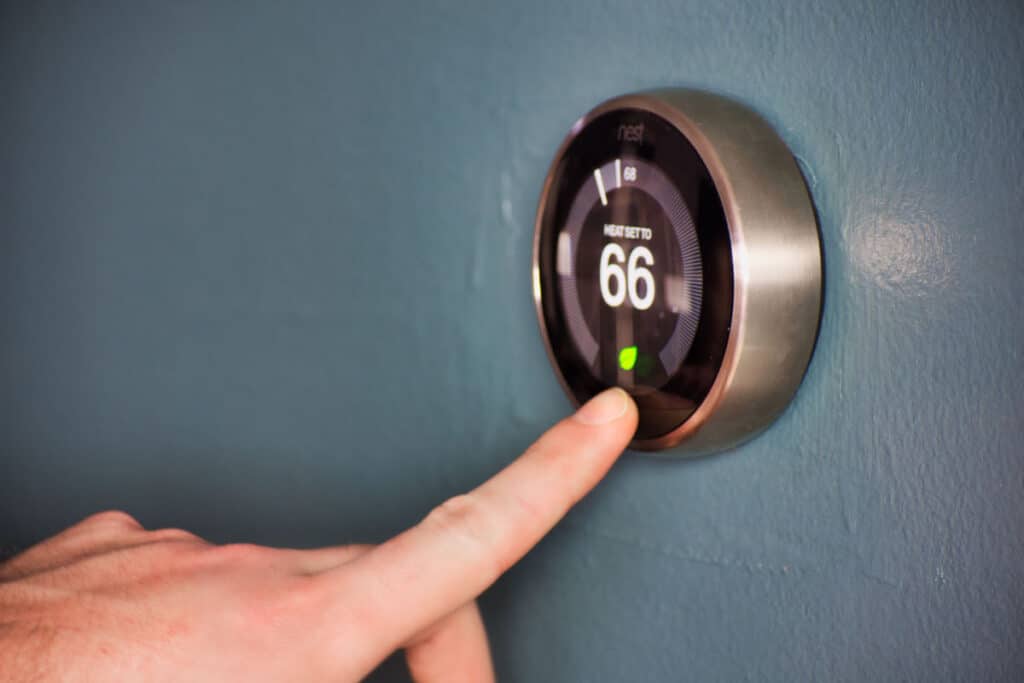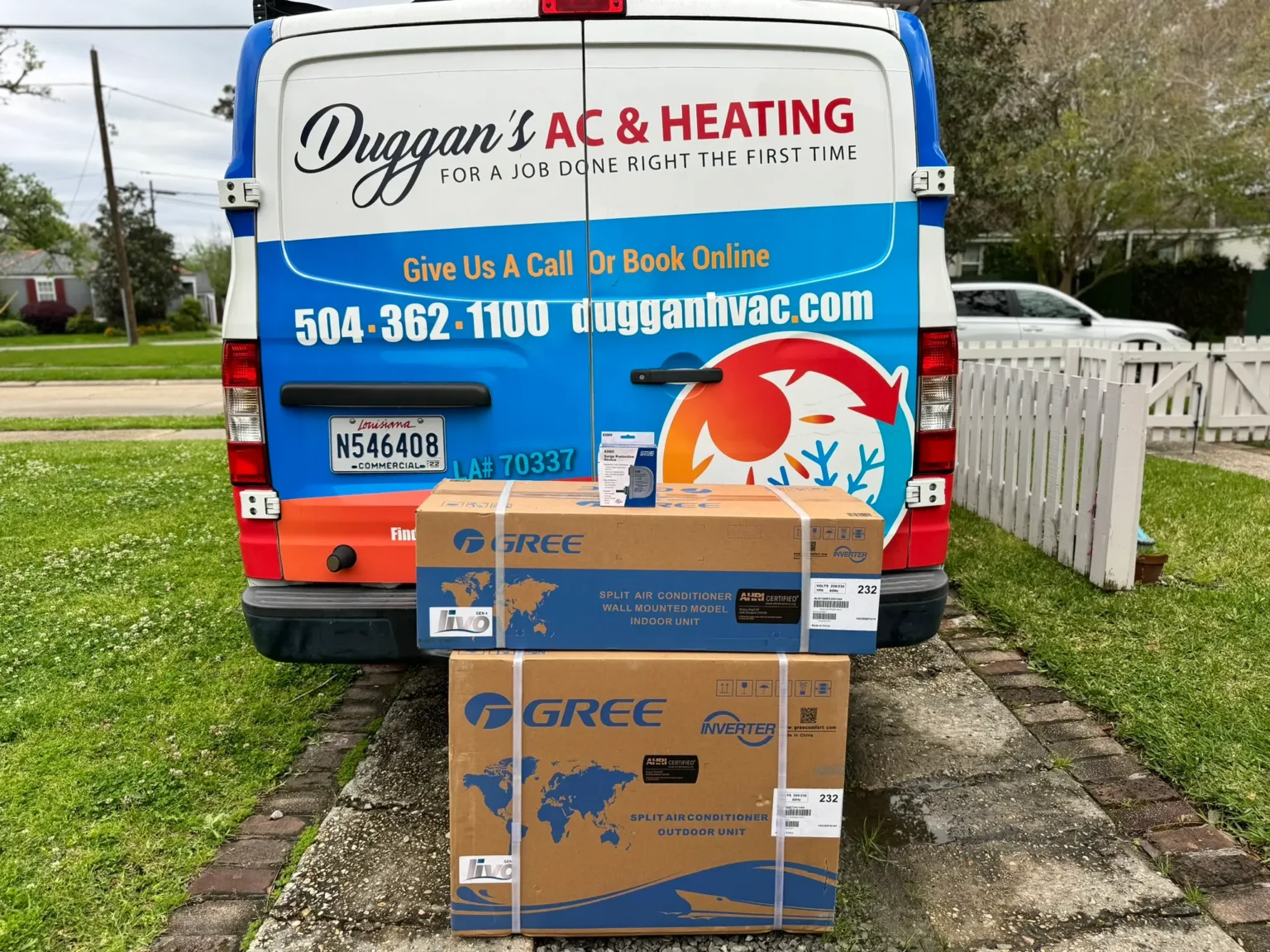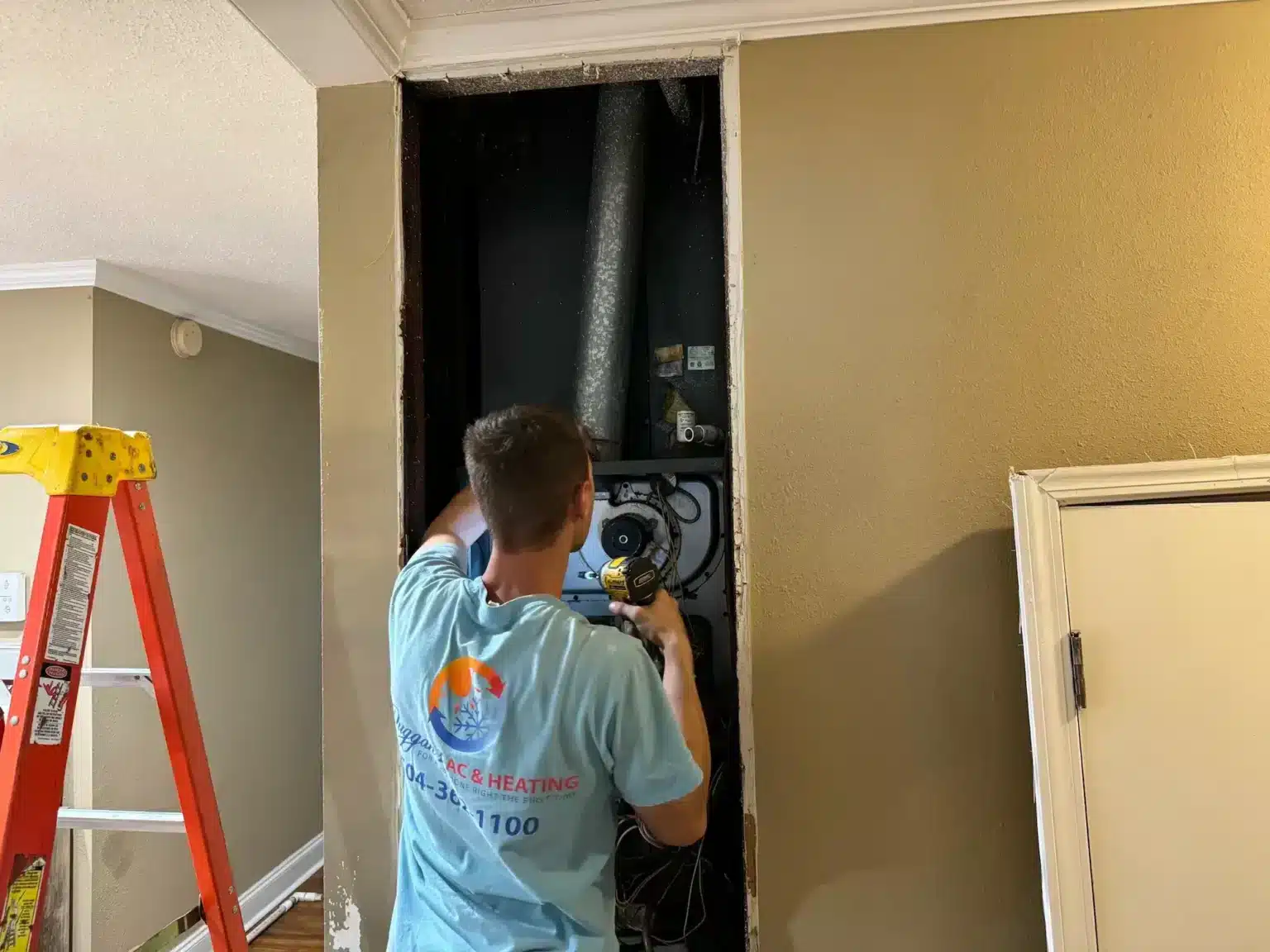Have you recently noticed a puddle of water around your air conditioner? You’re not alone. As an AC repair technician at Duggan’s AC & Heating, I’ve visited countless homes where homeowners are confused and concerned about water leaking from their cooling systems. Why is my air conditioning unit leaking water? This question comes up all the time, especially during hot, humid summer days in places like New Orleans and the surrounding areas.
Water leakage from your AC unit isn’t just annoying—it can lead to water damage, mold growth, and even complete system failure if left unchecked. But don’t worry! In this comprehensive guide, I’ll walk you through everything you need to know about AC water leaks, from why they happen to how you can fix them, and when it’s time to call in the professionals.
What Causes an Air Conditioning Unit to Leak Water?
Before we dive into the specifics, let’s understand something important: water production is actually a normal part of your air conditioner’s operation. During the cooling process, your AC removes moisture from the air, which condenses into water. Normally, this water drains away properly through the condensate drain line. When you notice water leaking where it shouldn’t be, that’s when we have a problem.
So, why is my air conditioning unit leaking water instead of draining it properly? Let’s look at the most common causes:
1. Clogged Condensate Drain Line
The number one reason why your air conditioning unit leaks water is a clogged condensate drain line. This drainage system is designed to carry condensation from your evaporator coil to a drain outside your home. Over time, this line can become blocked with:
- Dirt and debris: These particles build up gradually and can create significant blockages. They typically enter the system through tiny gaps or when the air filter isn’t doing its job properly. Once inside, they mix with the moisture in the drain line, creating a thick, sludge-like substance that sticks to the inner walls of the pipe. This buildup gets worse over time, eventually leading to a complete blockage that prevents water from flowing through.
- Algae and mold growth: The dark, moist environment of your drain line is perfect for these organisms to thrive. Algae can multiply rapidly in these conditions, forming green or black slime that adheres to the pipe’s interior. This biological growth is particularly problematic because it doesn’t just block water flow—it can also release spores into your home’s air, potentially affecting indoor air quality and causing health issues for people with allergies or respiratory conditions.
- Rust and mineral deposits: If you live in an area with hard water, mineral deposits can form inside the drain line. These minerals, primarily calcium and magnesium, precipitate out of the water and create hard, crusty deposits that narrow the pipe’s diameter. Similarly, in older systems, rust particles from deteriorating metal components can break off and contribute to blockages, creating a stubborn barrier that water cannot pass through easily.
When this drain line gets clogged, the water has nowhere to go except back into your home, leading to leakage around your indoor unit.
2. Dirty or Frozen Evaporator Coils
The evaporator coil is where the magic of cooling happens. It contains refrigerant that absorbs heat from your indoor air. When these coils get covered in dirt:
- The cooling process becomes less efficient, requiring your system to work harder and potentially freeze over.
- When coils freeze, ice forms and eventually melts when the system cycles off, creating excess water that may overflow your drain pan.
Why is my air conditioning unit leaking water when the weather gets really hot? Often, it’s because dirty coils are working overtime and freezing up in the process.
3. Damaged or Rusted Drain Pan
Your AC’s drain pan catches the condensation that drips off the evaporator coil. However, these pans don’t last forever:
- Older units (especially those over 15 years old) often have drain pans that have rusted through or cracked.
- When the pan is damaged, water leaks directly onto your floor or ceiling instead of flowing into the drain line.
4. Improper Installation
Sometimes the answer to “why is my air conditioning unit leaking water?” goes back to day one—improper installation. Common installation issues include:
- Unlevel air handler: Your AC unit needs to be installed perfectly level for proper drainage. If it’s tilted even slightly in the wrong direction, water won’t flow correctly into the drain line. This problem is particularly common in attic installations where the unit might have shifted over time or wasn’t properly secured during installation. You might notice this problem if water seems to collect in one corner of the drain pan rather than flowing toward the drain outlet.
- Incorrect drain line slope: The condensate drain line needs to slope downward away from your unit to allow gravity to move the water outside. If the line is installed flat or with an upward slope in certain sections, water will back up and eventually overflow. This issue requires repositioning the drain line to ensure consistent downward pitch throughout its entire length, which allows water to flow naturally without resistance.
- Wrong size unit: An oversized air conditioner will cycle on and off too frequently, not running long enough to properly dehumidify your home. This can lead to excessive condensation and potential water overflow. Similarly, an undersized unit will run constantly, creating more condensation than the system was designed to handle. Both scenarios put strain on the drainage system and can lead to water leakage problems that persist until the sizing issue is addressed.
5. Low Refrigerant Levels
Refrigerant is the lifeblood of your air conditioning system. When levels drop due to leaks:
- The pressure in your system changes, causing the evaporator coil to get too cold and freeze over.
- When this ice melts, it creates more water than your drainage system can handle.
This is a serious issue that requires professional attention to locate and repair the leak, then recharge the system with the correct amount of refrigerant.
6. Disconnected Drain Line
Sometimes the explanation for why your air conditioning unit is leaking water is simple—the drain line has become disconnected from your unit or at a connection point. This can happen due to:
- Vibration from the unit over time loosening connections
- Poor initial connection during installation or previous service
- Physical damage to the drain line from external forces
7. Extreme Humidity
In places like New Orleans, Metairie, and other parts of Louisiana, high humidity is a fact of life. When humidity levels soar:
- Your AC works harder to remove moisture from the air.
- This creates more condensation than normal, which can overwhelm your drainage system.
During particularly humid days, you might notice more water around your unit simply because it’s processing more moisture from your indoor air.
How Can I Tell If My Air Conditioning Unit Is Leaking Water?
Now that we understand why air conditioning units leak water, let’s talk about how to identify the problem early. Look for these warning signs:
1. Visible Water Pooling
The most obvious sign is water collecting around your indoor unit or dripping from the ceiling below an attic installation. This water might be clear or slightly dirty depending on what’s causing the blockage.
2. Musty Odors
When water isn’t draining properly, it can create perfect conditions for mold and mildew growth. If you notice a musty smell when your AC runs, water leakage might be the culprit.
3. Increased Humidity Indoors
One of your AC’s jobs is to dehumidify your home. If you’re suddenly feeling sticky or noticing condensation on windows despite your AC running, it might not be draining water properly.
4. Water Stains
Check your ceiling or walls near the indoor unit for water stains or discoloration, which indicate ongoing or previous water leakage issues.
5. System Not Cooling Properly
When components like evaporator coils freeze due to conditions that also cause leaking, your system won’t cool effectively. If your AC is running but not cooling well, check for water leaks too.
DIY Solutions for a Leaking Air Conditioner
If you’re asking “why is my air conditioning unit leaking water and what can I do about it?”, here are some steps you can take yourself:
1. Change Your Air Filter
A clean air filter is your first line of defense against many AC problems:
- Dirty filters restrict airflow, which can cause your evaporator coil to freeze and later leak.
- Aim to check your filter monthly and replace it every 1-3 months depending on your home’s conditions (more frequently if you have pets or allergies).
2. Clear the Condensate Drain Line
If a clogged drain line is the reason why your air conditioning unit is leaking water, try this:
- Locate the drain line exit point outside your home (usually a PVC pipe near the outdoor unit).
- Use a wet/dry vacuum to suction out the clog from this end.
- Alternatively, you can pour a cup of white vinegar down the access point near your indoor unit (if accessible) to dissolve biological growth.
3. Check and Clean the Drain Pan
Inspect your drain pan for damage:
- Remove any standing water with a wet/dry vacuum or towels.
- Clean the pan with a solution of bleach and water (1:10 ratio) to kill algae and mold.
- For small holes or cracks, you might be able to use epoxy to create a temporary seal.
4. Ensure Your Unit is Level
Use a level tool to check if your indoor unit is properly aligned:
- If it’s slightly off, you might be able to adjust the mounting brackets or platform.
- For more significant leveling issues, professional help is recommended.
5. Add a Secondary Drain Pan
If your unit is in an attic or above living spaces:
- Consider installing a secondary drain pan under your unit as added protection.
- You can also add a float switch that will shut off your AC if water levels get too high.
When to Call Professional AC Service for Water Leaks
While DIY approaches can help with minor issues, sometimes professional help is necessary. Call Duggan’s AC & Heating when:
1. The Leak Persists After DIY Attempts
If you’ve tried the steps above and are still wondering “why is my air conditioning unit leaking water?“, it’s time for expert diagnosis.
2. You Notice Refrigerant Issues
Signs of low refrigerant include:
- Ice formation on the refrigerant line
- Poor cooling performance
- Hissing sounds from the unit
Refrigerant handling requires specialized equipment and certification, making it strictly a job for professionals.
3. Electrical Components Are Near Water
Water and electricity don’t mix! If water is near any electrical parts of your system, turn off your AC at the breaker and call for emergency service immediately.
4. Your System Is Over 10 Years Old
Older systems are more prone to leaks from multiple worn components. Sometimes the most cost-effective solution is a system evaluation to determine if repair or replacement makes more sense.
5. There’s Significant Water Damage
If the leak has caused visible damage to your home’s structure or you suspect hidden damage, professional assessment is crucial.
How Duggan’s AC & Heating Can Help With Your Leaking Air Conditioner
At Duggan’s AC & Heating, we specialize in diagnosing and fixing the exact reasons why your air conditioning unit is leaking water. Our comprehensive service includes:
1. Thorough Diagnostic Assessment
Our technicians don’t just look at the obvious—we perform a complete system check to identify both the immediate cause of leakage and any contributing factors.
2. Professional Drain Line Clearing
We use specialized equipment to clear blockages completely:
- High-pressure air tools that can blast through stubborn clogs
- Professional-grade drain cleaners that are safe for your system
- Video inspection tools to verify the line is completely clear
3. System Repairs and Replacements
From replacing damaged drain pans to fixing refrigerant leaks, our team can handle all necessary repairs to stop the leaking permanently.
4. Preventative Maintenance
The best way to avoid asking “why is my air conditioning unit leaking water?” in the future is regular maintenance. Our AC Maintenance plans include:
- Cleaning evaporator and condenser coils
- Checking and clearing drain lines before they clog
- Inspecting drain pans for damage
- Checking refrigerant levels
- Ensuring proper airflow throughout the system
5. Emergency Service
Water leaks don’t wait for convenient times to happen. That’s why we offer emergency service throughout New Orleans, Metairie, Belle Chasse, Gretna, and surrounding areas.
Preventing Future Air Conditioner Water Leaks
After addressing the immediate question of “why is my air conditioning unit leaking water?”, let’s focus on prevention:
1. Schedule Regular Maintenance
The single best way to prevent leaks is professional maintenance:
- Schedule AC maintenance at least once a year, preferably before the summer season begins.
- Professional technicians can spot potential issues before they lead to leaks or system failure.
2. Install a Condensate Pump
If your AC is located in a basement or other area where gravity drainage is difficult:
- A condensate pump can actively move water to an appropriate drain.
- These pumps often include safety switches that shut off your AC if the pump fails.
3. Use Algae Tablets or Strips
Biological growth in drain lines is a leading cause of blockages:
- Anti-algae tablets placed in your drain pan can prevent growth before it starts.
- These slowly dissolve over time, continuously treating the water that passes through.
4. Consider a Drain Line Flush System
For homes in highly humid areas like New Orleans:
- Automatic flush systems can be installed that periodically clean your drain line.
- These systems connect to your drain line and release a cleaning solution at programmed intervals.
5. Upgrade to a Smart Thermostat
Smart thermostats can help prevent conditions that lead to leaks:
- They maintain more consistent temperatures, reducing the chance of coil freezing.
- Many models monitor system performance and can alert you to potential issues before they cause leaks.
- Some advanced models even have humidity sensors that help your AC manage moisture more effectively.
The Impact of Ignoring AC Water Leaks
Still wondering if it’s worth addressing why your air conditioning unit is leaking water? Consider these potential consequences of ignoring the problem:
1. Structural Damage
Water leaks can cause serious damage to:
- Ceiling materials, leading to staining, sagging, or even collapse
- Flooring, including warping of hardwood or damage to carpet and padding
- Wall materials, resulting in paint damage, wallpaper peeling, or drywall deterioration
- Insulation, reducing its effectiveness and potentially causing it to become a breeding ground for mold
2. Mold and Mildew Growth
Water from your AC creates perfect conditions for mold:
- Mold can begin growing within 24-48 hours of continued moisture.
- Once established, it can spread through your HVAC system and into your living spaces.
- According to the Centers for Disease Control and Prevention (CDC), exposure to mold can cause throat irritation, coughing, eye irritation, nasal stuffiness, and skin irritation in sensitive individuals.
3. Higher Energy Bills
When your AC isn’t working properly due to issues that cause leaking:
- It runs less efficiently, consuming more electricity.
- You pay more for less comfort—a lose-lose situation!
4. Complete System Failure
Unchecked water leakage can eventually lead to:
- Electrical shorts in system components
- Motor failure due to rust and corrosion
- Compressor issues from related problems like refrigerant leaks
5. Reduced Indoor Air Quality
Water leaks can contribute to poor indoor air quality through:
- Increased humidity levels that make your home feel uncomfortable
- Mold spores circulating through your ductwork
- Musty odors that permeate your living spaces
Common Questions About AC Water Leaks
Let’s address some frequently asked questions about why air conditioning units leak water:
Is it normal for my air conditioner to drip water outside?
Yes! This is actually a good sign. Your AC is designed to drain condensed water through the condensate line to the outside of your home. You should see some water dripping from this line during operation, especially on humid days. This means your drainage system is working properly.
How much water leakage is considered normal?
During normal operation, your AC might produce up to 5-20 gallons of water per day, depending on humidity levels and how much the system runs. However, this water should be draining outside through the condensate line—not leaking inside your home or pooling around your indoor or outdoor unit.
Can I use bleach to clean my AC’s drain line?
While bleach can kill mold and algae, we recommend using vinegar instead. Bleach can be corrosive to certain types of pipes and fittings used in AC drain lines. White vinegar is equally effective at preventing and eliminating biological growth without the risk of damaging your system components.
Will a leaking air conditioner still cool my home?
It might continue cooling initially, but not efficiently, and not for long. The same conditions that cause leaking (frozen coils, airflow problems, refrigerant issues) also reduce cooling efficiency. Additionally, if the leak triggers safety switches, your system may shut down completely.
How often should I have my drain line professionally cleaned?
As part of regular AC maintenance, we recommend having your drain line professionally cleaned at least once a year. If you live in a particularly humid area like New Orleans or have had clogging issues in the past, twice-yearly cleaning might be appropriate.
Can installing a new air conditioner solve my leaking problems?
If your current unit is old, damaged, or improperly sized for your home, then yes—installing a new air conditioner can eliminate leaking problems. Modern units are more efficient at managing condensation and often come with improved drainage systems. However, even new units need proper installation and maintenance to prevent leaks.
Specific AC Water Leak Issues in Louisiana
Living in Louisiana presents unique challenges when it comes to understanding why your air conditioning unit is leaking water. Our local climate affects AC systems in specific ways:
High Humidity Challenges
In New Orleans, Metairie, Belle Chasse, and Gretna, humidity levels routinely exceed 80%. This means:
- Your AC system removes significantly more moisture from the air than in drier climates.
- Drain lines can become clogged more quickly due to the constant flow of condensation.
- Biological growth in drain lines is accelerated due to the combination of heat and moisture.
Extended Cooling Season
With our long, hot summers, air conditioners in Louisiana:
- Run for more months of the year, creating more wear and tear on drainage components.
- Have less downtime for natural drying of drain lines and pans.
- Process more condensation annually than units in cooler regions.
Storm and Power Outage Effects
Our area’s vulnerability to storms and power outages can impact your AC’s drainage:
- Power fluctuations can damage pumps and drainage system components.
- After power outages, condensation that collected while the system was off can suddenly flow when power returns, potentially overwhelming the drainage system.
When to Consider AC Replacement vs. Repair for Leaking Units
If you’ve repeatedly asked “why is my air conditioning unit leaking water?” despite repairs, it might be time to consider replacement. Here’s how to decide:
Age of Your System
- Systems over 10-15 years old are more prone to developing leaks from multiple worn components.
- Newer technology in modern AC units includes better condensate management features.
Frequency of Repairs
If you’ve had multiple leak-related repairs in recent years, replacement might be more cost-effective in the long run.
Efficiency Considerations
Older units that leak are also likely:
- Less energy-efficient than modern models
- More expensive to operate month-to-month
- Less effective at controlling humidity
Environmental Concerns
If your current system:
- Uses older refrigerants that are being phased out
- Has developed refrigerant leaks (which often cause water leaks too)
- Is oversized for your home (leading to short-cycling and poor dehumidification)
Then AC replacement might be the more responsible choice both environmentally and financially.
Why Choose Duggan’s AC & Heating for Your Leaking Air Conditioner
When you’re dealing with water leakage from your AC, you need reliable, knowledgeable service. At Duggan’s AC & Heating, we offer:
Local Expertise
Our technicians understand the unique challenges that Louisiana’s climate presents for AC systems, especially when it comes to why air conditioning units leak water in our high-humidity environment.
Comprehensive Solutions
We don’t just fix the symptom—we identify and address the root cause of your AC’s water leakage to prevent recurrence.
Fast Response Times
Water leaks can quickly cause damage, so we prioritize these service calls to protect your home.
Transparent Pricing
Before performing any repairs, we provide clear explanations and upfront pricing so you can make informed decisions about your AC system.
Ongoing Support
From routine maintenance to emergency repairs, we’re here to support all your HVAC needs throughout the year.
Call Duggan’s AC & Heating to Solve Your AC Water Leakage Problems
Have you been wondering, “Why is my air conditioning unit leaking water?” Don’t wait until a small leak becomes a big problem. Contact our team of experienced professionals today!
Call us at (504) 215-7031 or visit our Contact Page to schedule service. Our technicians serve homes throughout New Orleans, Metairie, Belle Chasse, Gretna, and surrounding areas.
Don’t let water leaks damage your home or disrupt your comfort. Trust Duggan’s AC & Heating to keep your air conditioning system running smoothly and leak-free all season long!
Regular AC maintenance is your best defense against unexpected leaks and system failures. Contact us today to sign up for our maintenance plan and enjoy peace of mind knowing your AC system is in good hands.




